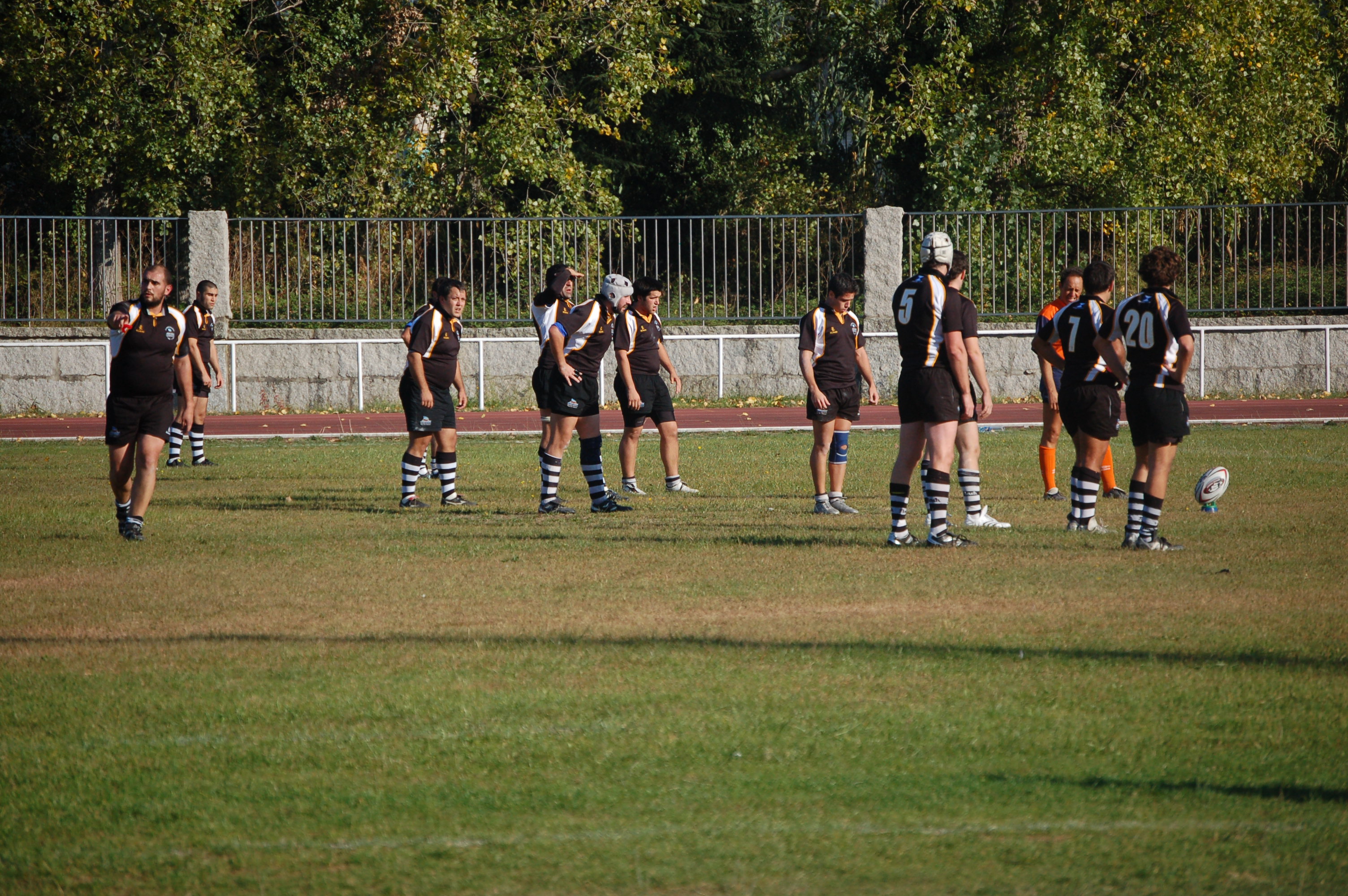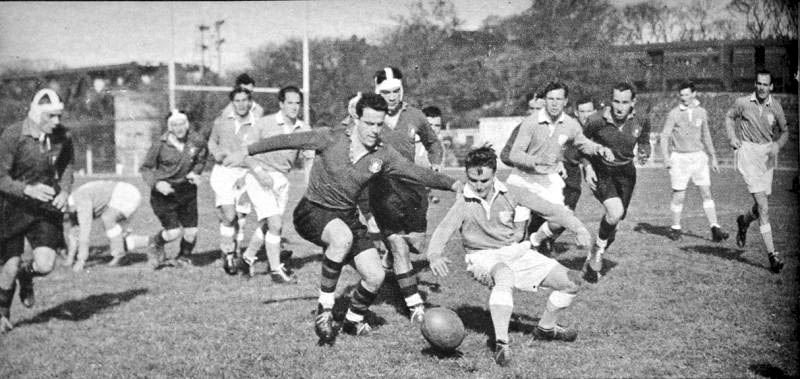|
Rugby Union In Portugal
Rugby union in Portugal is a very prevalent sport, though still a long distance from association football. The sport is essentially amateur in Portugal, with some professionalisation in its top flight league and the national rugby union team. The rugby union teams in Portugal are mostly university sides, from Lisbon, Porto and Coimbra, with multi-sport clubs like Benfica and Belenenses having rugby union collectivities. Governing body Rugby union in Portugal is administered by the Federação Portuguesa de Rugby. It was founded in 1926 and became affiliated to the International Rugby Board in 1988.Bath p73 History The first recorded game in Portugal occurred at Cruz Quebrada on the outskirts of Lisbon in 1903. All the players were British. However, it was only in the 1920s, and, later, in the 1950s that periods of consolidation occurred. 1920s In 1922 that the game began to be organized on a formal basis. The Anglo-Portuguese playing pool at this point had been severely ... [...More Info...] [...Related Items...] OR: [Wikipedia] [Google] [Baidu] |
Portuguese Rugby Federation
The Portuguese Rugby Federation () is the governing body for rugby union in Portugal. It was founded in 1926 and became affiliated to the International Rugby Board in 1988. History The first game of rugby union in Portugal was played in 1903 by British officials against British expats representing Lisbon Football Club. The predecessor union, the Associação de Rugby de Lisboa (English: Association of Rugby in Lisbon) was founded in 1926 by British and French expatriates alongside some local Portuguese players. This would later expand to cover the whole of Portugal with the Portuguese Rugby Federation being established as the national rugby union of Portugal in 1957. The PRF was a founder member of the Fédération Internationale de Rugby Amateur in 1934. They affiliated to the International Rugby Football Board in 1988. Following qualification to the 2007 Rugby World Cup leading to an increase in interest, the PRF stated that they were unable to keep up with the demand for rug ... [...More Info...] [...Related Items...] OR: [Wikipedia] [Google] [Baidu] |
Porto
Porto (), also known in English language, English as Oporto, is the List of cities in Portugal, second largest city in Portugal, after Lisbon. It is the capital of the Porto District and one of the Iberian Peninsula's major urban areas. Porto city proper, which is the entire concelho, municipality of Porto, is small compared to its metropolitan area, with an estimated population of just 248,769 people in a municipality with only . Porto's urban area has around 1,319,151 people (2025) in an area of ,Demographia: World Urban Areas , March 2010 making it the second-largest urban area in Portugal. It is recognized as a global city with a Gamma + rating from the Globalization and World Cities Research Network. Located along the Douro River estuary in northern Portugal, Porto is one of the oldest European centers and ... [...More Info...] [...Related Items...] OR: [Wikipedia] [Google] [Baidu] |
Spanish Rugby Federation
The Royal Spanish Rugby Federation () is the governing body for the sport of rugby union in Spain. The Spanish Rugby Federation was founded in 1923, and joined the International Rugby Football Board, later known as the International Rugby Board and now as World Rugby, in 1988. It is located in Madrid. See also * Spain national rugby union team * Spain women's national rugby union team * Spain national rugby sevens team * Spain women's national rugby sevens team * Spain national under-20 rugby union team * Rugby union in Spain * División de Honor de Rugby (Spain's top tier domestic rugby union competition) *División de Honor B de Rugby (Spain's second tier domestic rugby union competition) External links *Official Site References {{Authority control Sports governing bodies in Spain, Rugby Rugby union in Spain Rugby union governing bodies in Europe National members of World Rugby Sports organizations established in 1923 1923 establishments in Spain ... [...More Info...] [...Related Items...] OR: [Wikipedia] [Google] [Baidu] |
Uruguay National Rugby Union Team
The Uruguay national rugby union team (Spanish language, Spanish: '' Selección de rugby de Uruguay''), nicknamed ''Los Teros'', represents the Uruguayan Rugby Union in men's international rugby union . One of the older test sides in the world, Uruguay has qualified five times for the Rugby World Cup, in 1999, 2003, 2015, 2019 and most recently 2023. As of 10 July 2023 they are ranked 17th in the world, and are ranked 2nd in the Americas region, behind rivals Argentina. Uruguay has consistently been one of the better fringe international sides in rugby union, having consistently beaten Tier 2/3 competition from across the globe. Uruguay won the South American Rugby Championship in 1981, the only time (pre-2014) that a team other than Argentina won the tournament. They came second on 19 occasions and third the remaining 9. As of 2012, Uruguay has been classified as a Tier 2 nation, which allows them to receive more funding from World Rugby. Their home stadium is Estadio Charrúa in ... [...More Info...] [...Related Items...] OR: [Wikipedia] [Google] [Baidu] |
2003 Rugby World Cup
The 2003 Rugby World Cup was the fifth Rugby World Cup and was won by England national rugby union team, England. Originally planned to be co-hosted by Australia and New Zealand, all games were shifted to Australia following a contractual dispute over ground signage rights between the New Zealand Rugby Union and Rugby World Cup Limited. The pre-event favourites were England national rugby union team, England, regarded by many at the time as the best team in the world. New Zealand national rugby union team, New Zealand, France national rugby union team, France, South Africa national rugby union team, South Africa and defending champions Australia national rugby union team, Australia were also expected to make strong showings, with New Zealand being second favourites after victory in the southern-hemisphere Tri-Nations championship. The tournament began with host nation Australia defeating Argentina 24–8 at Stadium Australia in Sydney. Australia went on to defeat New Zealand 22� ... [...More Info...] [...Related Items...] OR: [Wikipedia] [Google] [Baidu] |
2007 Rugby World Cup
The 2007 Rugby World Cup () was the sixth Rugby World Cup, a quadrennial international rugby union competition organised by the International Rugby Board. Twenty nations competed for the Webb Ellis Cup in the tournament, which was hosted by France from 7 September to 20 October. France won the hosting rights in 2003, beating a bid from England. The competition consisted of 48 matches over 44 days; 42 matches were played in 10 cities throughout France, as well as four in Cardiff, Wales, and two in Edinburgh, Scotland. The eight quarter-finalists from 2003 were granted automatic qualification, while 12 other nations gained entry through the regional qualifying competitions that began in 2004 – of them, Portugal was the only World Cup debutant. The top three nations from each pool at the end of the pool stage qualified automatically for the 2011 World Cup. The competition opened with a match between hosts France and Argentina on 7 September at the Stade de France in Saint-D ... [...More Info...] [...Related Items...] OR: [Wikipedia] [Google] [Baidu] |
Wales National Rugby Union Team
The Wales national rugby union team () represents the Welsh Rugby Union in men's international rugby union. Its governing body, the Welsh Rugby Union (WRU), was established in 1881, the same year that Wales played their first international against England national rugby union team, England. The team plays its home matches at the Millennium Stadium in Cardiff, which replaced National Stadium, Cardiff, Cardiff Arms Park as the national stadium of Wales in 1999. Wales has competed annually in the Six Nations Championship (previously the Home Nations Championship and Five Nations Championship) since it was established in 1883. They have won the tournament (and its predecessors) outright 28 times, most recently in 2021 Six Nations Championship, 2021. Since the Six Nations was formed in 2000, Wales have won six Six Nations titles, including four Grand Slams, and finished bottom three times. Wales has also participated in every Rugby World Cup since the competition was established in 1 ... [...More Info...] [...Related Items...] OR: [Wikipedia] [Google] [Baidu] |
Oporto Cricket And Lawn Tennis Club
The Oporto Cricket and Lawn Tennis Club is a multi-sports and social club located on Campo Alegre in Porto, Portugal. It was founded in 1855 by the British people working in Porto. Initially founded as Oporto Cricket Club, it is the oldest cricket club in mainland Europe. In 1877 they built three tennis courts and the name of the club was changed to its current form. In 1923 the present grounds were acquired. It was one of the first companies to play football in Portugal, and in 1894, the club disputed the first football cup played on the Iberian Peninsula, the Taça D. Carlos I, which they lost to a team from Lisbon. History Origins In the mid 19th century, Porto enjoyed one of the most developed industries in the country, mainly thanks to its wine industry, and for this reason, Porto soon became the home to a British colony, that like in the rest of the world, brought cricket with them, and later football. They began to play cricket matches against each other to pass the t ... [...More Info...] [...Related Items...] OR: [Wikipedia] [Google] [Baidu] |
Sporting Clube De Portugal
Sporting Clube de Portugal (), otherwise referred to as Sporting CP or simply Sporting (particularly within Portugal), or as Sporting Lisbon in other countries,From Sporting Lisbon to Athletic Bilbao — why do we get foreign clubs' names wrong? , Michael Cox, The Athletic, 16 March 2023 is a Portuguese based in . Having various sports departments and sporting disciplines, it is best known for its men's professional [...More Info...] [...Related Items...] OR: [Wikipedia] [Google] [Baidu] |
First World War
World War I or the First World War (28 July 1914 – 11 November 1918), also known as the Great War, was a World war, global conflict between two coalitions: the Allies of World War I, Allies (or Entente) and the Central Powers. Fighting took place mainly in European theatre of World War I, Europe and the Middle Eastern theatre of World War I, Middle East, as well as in parts of African theatre of World War I, Africa and the Asian and Pacific theatre of World War I, Asia-Pacific, and in Europe was characterised by trench warfare; the widespread use of Artillery of World War I, artillery, machine guns, and Chemical weapons in World War I, chemical weapons (gas); and the introductions of Tanks in World War I, tanks and Aviation in World War I, aircraft. World War I was one of the List of wars by death toll, deadliest conflicts in history, resulting in an estimated World War I casualties, 10 million military dead and more than 20 million wounded, plus some 10 million civilian de ... [...More Info...] [...Related Items...] OR: [Wikipedia] [Google] [Baidu] |
Cruz Quebrada
Cruz is mostly a surname but is also used as a first name. It is of Iberian origin, first found in Castile, Spain, and later spread throughout the territories of the former Spanish and Portuguese Empires. In Spanish and Portuguese, the word means "cross", either the Christian cross or the figure of transecting lines or ways. For example, in the Philippines, the adopted Tagalog word is rendered to "krus" in plain usage, but the Spanish spelling survives as a surname. The word "Cruz" (Spanish for "Cross"), as well as "Vera Cruz" ("True Cross") and "Santa Cruz" ("Holy Cross") are used as surnames and toponyms. Its origin as a surname particularly flourished after the Alhambra Decree of 1492 and the increasing activities of the Spanish Inquisition, when New Christian families with Crypto-Jewish, Moorish, and/or mixed religious heritage converted to the state-enforced religion of Catholicism and subsequently fashioned and adopted surnames with unambiguous religious affiliation. As ... [...More Info...] [...Related Items...] OR: [Wikipedia] [Google] [Baidu] |




